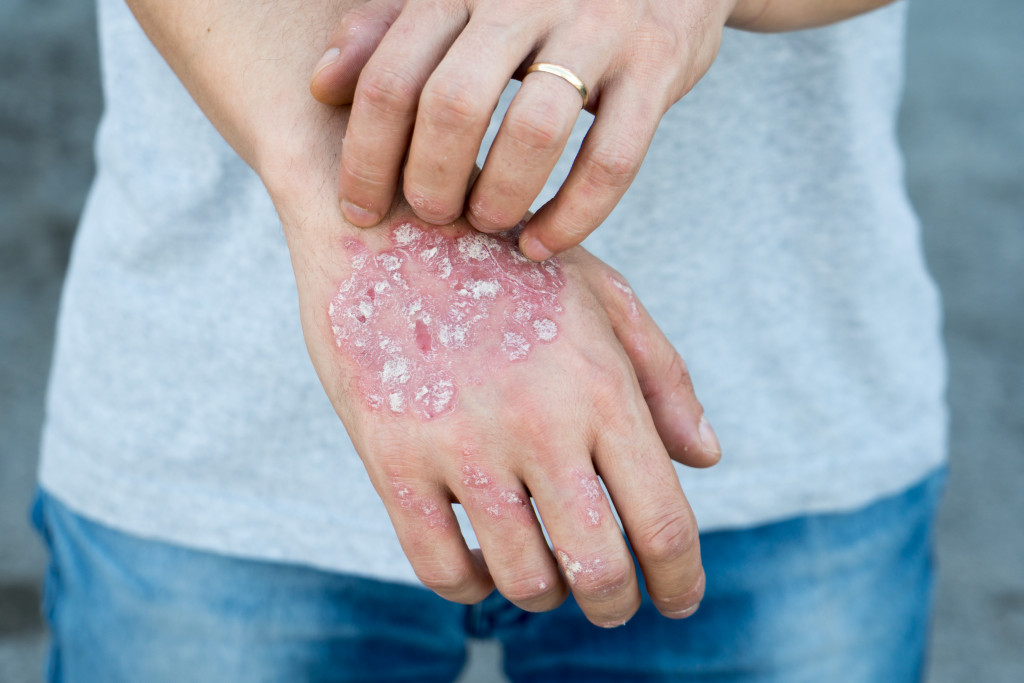- Follow a prescribed diet and lifestyle plan to maintain optimum health and reduce flare-ups.
- Use non-irritating skin and hair products that won’t further irritate sensitive skin, and take medications as prescribed.
- Limit exposure to triggers such as stress and smoking that can worsen symptoms, and apply topical creams or ointments regularly.
- Wear loose-fitting clothes that allow air circulation to reduce irritation and inflammation associated with psoriasis.
Psoriasis is an autoimmune disease that affects the skin, resulting in red, scaly patches and sometimes causing itching or burning sensations. It can be a frustrating condition to live with, but there are things you can do to manage your symptoms and find relief. By considering these steps, living with psoriasis does not have to be so daunting a task.
Implement lifestyle changes
Here are some lifestyle changes you can do if you have psoriasis:
Follow a prescribed diet and lifestyle plan.

A prescribed diet and lifestyle plan are vital to maintaining optimum mental and physical health when managing psoriasis. Eating the right foods and avoiding those exacerbating symptoms can help alleviate flare-ups and improve overall well-being. It’s essential to consider personal dietary preferences and specific medically-guided restrictions when constructing your individualized meal plan.
Additionally, adopting lifestyle changes such as improved sleep hygiene and moderate exercise can help reduce the impact of psoriasis on daily functioning and quality of life. Developing healthy habits about nutrition, exercise, stress management, and environmental safety will assist you in living the best life possible.
Use non-irritating skin and hair products.

When dealing with psoriasis, often one of the most important things to consider is which skin and hair products you use. It is essential to use gentle, non-irritating products that won’t further irritate sensitive skin. Avoiding comedogenic ingredients or potential irritants is critical to preventing flare-ups or reactions.
Alternatively, you could opt for natural, organic products that are easier on the skin and scalp. If you suffer from dryness or itchiness of the scalp, look for a shampoo and conditioner for dry and itchy scalp, as this can help reduce itching and soothe any sore areas.
Take medications as prescribed.
As with any condition, it is essential to adhere to the instructions given by a physician regarding taking medications for psoriasis. Taking proper and consistent doses as prescribed can help promote healing and ensure the disease does not worsen over time.
However, if treatment is neglected and medication is taken irregularly or inconsistently, the symptoms of psoriasis may be exacerbated and cause more distress than before. It is also essential to recognize that many medications used to manage psoriasis can have side effects and should be closely monitored by a healthcare professional throughout a patient’s treatment.
Limit exposure to triggers.
Managing your psoriasis flares is essential to living with the condition. To do so, it is important to limit exposure to triggers such as stress and smoking that can exacerbate symptoms. For those struggling with stress-induced psoriasis outbreaks, incorporating stress management techniques like yoga and mindfulness into your routine can help you gain control of your mental well-being.
Additionally, quitting smoking if you are a smoker is highly recommended for those with psoriasis since nicotine smoke has been linked to flare-ups or worsening symptoms in people with the disorder. Not only can limiting exposure to these common psoriasis triggers help reduce the risk of spread and severity of the condition, but it may also lead to improvements in other physical and mental health aspects.
Apply topical creams or ointments regularly.
Applying topical creams or ointments regularly for psoriasis is of the utmost importance for correct dosage and to prevent flares. If topical creams or ointments are not utilized appropriately, they may be unable to do their job, worsening symptoms over time.
In addition, diligent application helps to ensure that the appropriate amount of the cream is absorbed into your skin, providing more youthful and hydrated results while aiding in reducing pain associated with the condition.
Lastly, when you apply these daily creams as directed by your physician, it minimizes your risk of an infection as well as any side effects that could result from prolonged usage. With a steady schedule of topical creams or ointments, one can expect fewer flares and improved quality of life overall.
Wear loose-fitting clothes that allow for air circulation
When suffering from psoriasis, wearing loose-fitting clothes that allow air circulation is important. This gives the skin extra room to breathe, enabling oxygen and other natural nutrients to penetrate more deeply, which can help reduce irritation and inflammation. If fabric clings too much to the skin and traps air and moisture on the skin surface, it can increase discomfort and worsen symptoms.
Loose-fitting cotton clothes are a smart choice for psoriasis sufferers due to their breathability and softness against the skin. Additionally, lightweight fabrics like linen or synthetic materials such as nylon or polyester can be useful depending on your unique needs. The key is balancing allowing the skin to breathe and keeping warm during cold weather.
These are just some of the steps you can take to manage your psoriasis symptoms. Everyone’s case is unique, so it is important for individuals suffering from psoriasis to work closely with their healthcare providers and develop a personalized plan for each one.

